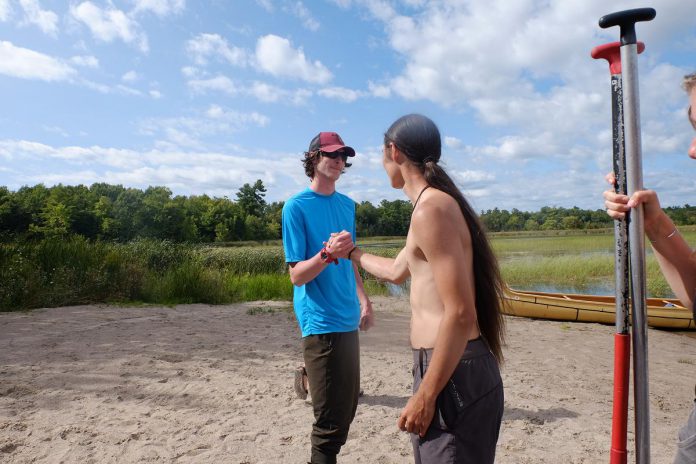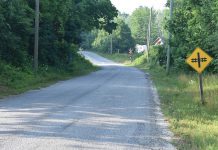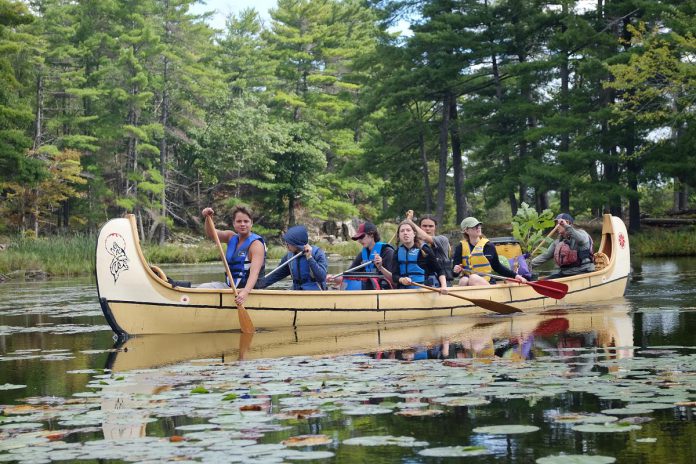
Something that isn’t broken doesn’t require fixing, but that doesn’t mean a tweak here and there isn’t beneficial. That said, the six-day Adventure In Understanding canoe trip, an ongoing project of the Rotary Club of Peterborough Kawartha, is far from broken.
With the eighth edition now in the books, the experiential journey remains true to its original intent of providing First Nations and non-native youth, aged 16 to 18 years old, with the trip of a lifetime via a 100-kilometre trek from Beavermead Park to Curve Lake First Nation.
With the Canadian Canoe Museum, Camp Kawartha and Curve Lake First Nation fully on board as partners, the first Adventure In Understanding program was offered in 2014. While just four students made the inaugural trek, that grew to 20 young people in 2016.
But this time around, a tweak came in the form of the participation of Dorianna Chessa — a land-based educator with the Gulf Islands School District in British Columbia, specifically Salt Spring Island in the Strait of Georgia off south Vancouver Island — who brought two paddles with her that were carved by someone from Curve Lake.
The pandemic forced its cancellation in 2020 and 2021 but it returned in 2022, and this year’s journey saw 20 youth and five leaders depart August 27 from Beavermead Park, making overnight stops at Trent University’s Champlain College, Lakefield College School, Camp Kawartha, and Wolf Island Provincial Park before arriving at Curve Lake First Nation — where a celebratory feast and ceremonial tree planting on September 1 marked the end of the journey.
Rotarian Don Watkins has been involved since day one, working with fellow service club member Janet McLeod to forge and nurture partnerships with the Canadian Canoe Museum, Camp Kawartha, and Curve Lake First Nation that remain intact to this day.
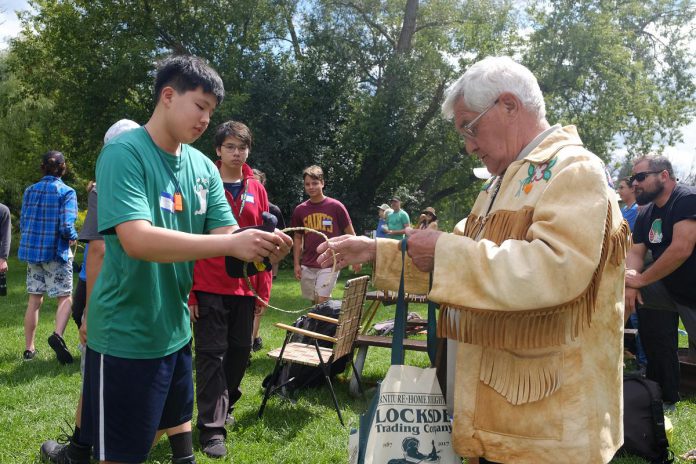
This year’s trek, says Watkins, saw youths from 12 Ontario communities participate — five from the Peterborough area — alongside a Rotary exchange student from Kanzawa, Japan and one of Chessa’s former students. Five of participants, notes Watkins, have Indigenous heritage as part of their background.
“Canoe and no phones equals friendship,” says Watkins, a reference to the close bond that develops between the paddlers when they are bereft of the technology that has defined a generation. “It only takes about a day (before they don’t miss having their phones). They’re so busy being involved and talking to their new friends.”
Watkins, who is chair of the program, works behind the scenes on trip registration and confirming the itinerary, which includes overnight accommodations and food provision. Along for the trip, however, were five on-water leaders — Peterborough musician, puppeteer, and environmental educator Glen Caradus among them. Caradus, notes Watkins, has made all eight trips.
When not on the water, the group was treated to teachings by Curve Lake First Nation Chief Keith Knott, Canadian Bushcraft owner Caleb Musgrave of Hiawatha First Nation, Brittany Taylor of Curve Lake First Nation, and Curve Lake Elder Lorenzo Whetung.
The agenda was not unlike that of trips in past years, the exception being Chessa’s participation, which is a story onto itself.
“I was looking for a paddle to buy and found these beautiful hand-carved paddles on the Facebook marketplace in Victoria,” she recalls, noting she bought three of the paddles. “As I was leaving, he (the seller) told me they had been carved by someone from Curve Lake First Nation. When I got home, I googled ‘Curve Lake First Nation paddle’ and the Adventure In Understanding program came up.”
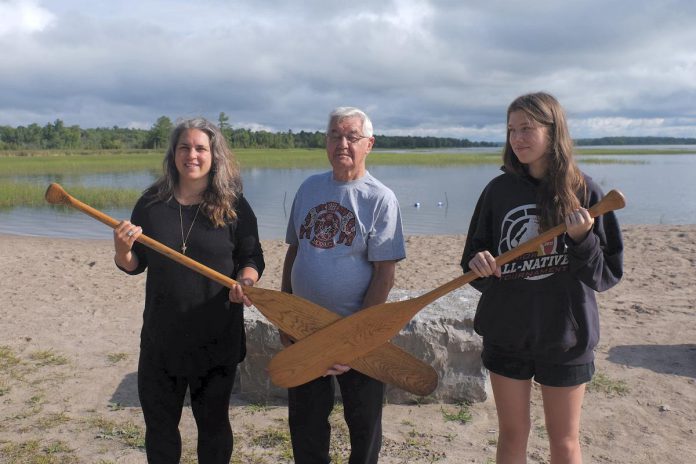
Having created her own non-profit organization, the Outdoor Wellness Leadership Society, just last year, Chessa was intrigued. She subsequently emailed Watkins to learn more. Watkins details what happened next.
“I showed her email to a friend of mine,” he explains. “When I said ‘This person wants to come and see what’s going on,’ (my friend) said ‘I have a surplus of air miles. I will donate them to pay for her to come.'”
“When Glen and I were talking to her (via Facetime), we talked about the program and then we asked ‘Would you like to come?’,” Watkins adds. “She was blown away. She called me back the next morning and said ‘Yes, I want to come.'”
“It was pretty hard to pass up,” says Chessa. “The only thing I felt unsure about was taking the place of an Indigenous youth. So I asked one of my former students, who has Ojibwe ancestry, if she wanted to come. I worked it out with her family and Don and she was able to.”
Chessa brought two of the paddles with her.
“She used one and I used the other for the whole paddle. I brought two thinking I was going leave one, but I brought them both back with me. It seemed like the right thing to do was to keep them paddling.”
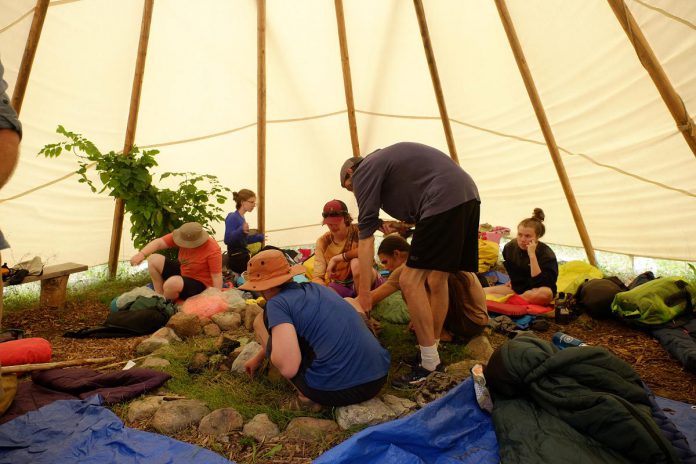
Chessa was so impressed by the Adventure In Understanding program, she’s determined to launch and offer a similar program next summer, involving the local Cowichan Nation.
“It was really inspiring to see youths connecting in this way,” she says. “One of them said she felt like she was curious to learn and related how good that felt. It’s such a different way to connect — being on the land, being on the water, being without cellphones, having teachings every evening from different Indigenous elders and knowledge keepers.”
Chessa echoes comments made by previous participants about the life-changing impact the journey can have on youth.
“They have the opportunity to have a healthy relationship with themselves, with others, and with the land and water,” she says. “They grow up in a way that they haven’t grown up before. They can relate to others from a place of who they really are, and not who they’re trying to fit in to be.”
For his part, Watkins remains thrilled that Chessa connected with him and was able to participate with an eye on offering a similar program in B.C.
“It’s the first time, since the program started, that anybody has picked up on it,” says Watkins, adding “The best way to find out what happens is to come and be with us.”
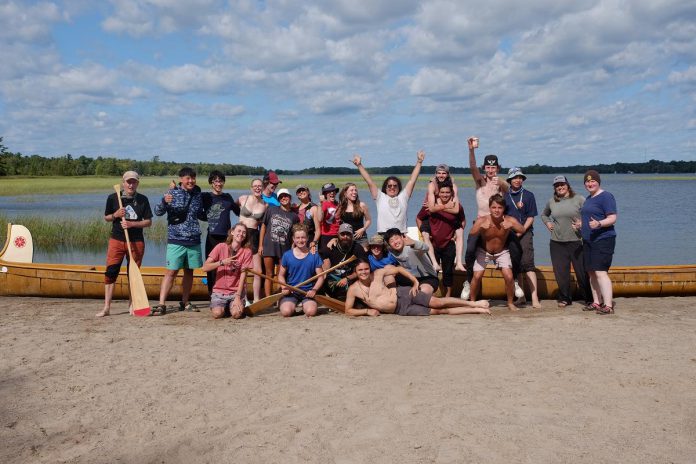
“We have a small program here. We can’t get any bigger — we don’t want to get any bigger — but we think it’s a template that others can copy.”
Watkins is equally thrilled to hear positive comments from parents of youths who participated, one of whom wrote “It’s clear to me that this experience had a profound impact on (my son). He has returned a more mature and stronger young man.’
“I was quite overwhelmed when I read that,” says Watkins. “Yes, it takes some time to put it together but it’s worth it.”
